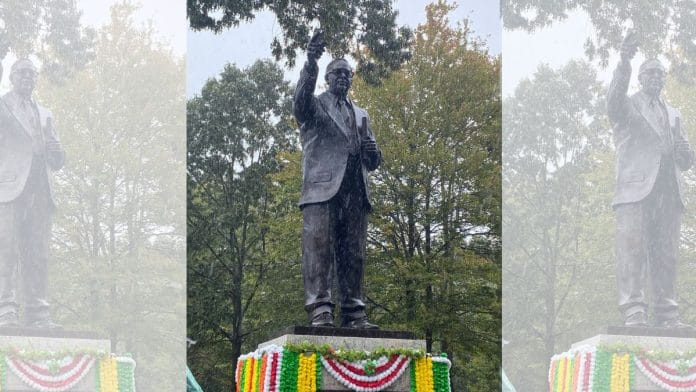On 14 October 2023, a momentous occasion unfolded in the heart of the United States. A few miles from the White House, Indian-American Ambedkarites unveiled the ‘Statue of Equality’ of BR Ambedkar to observe Dhamma Chakra Pravatan Din, celebrating the transformative journey of Dalits.
This milestone, despite its historical significance, seems to have gone unnoticed by the Indian government’s top echelons. Such an oversight raises a poignant question: why didn’t Indian Prime Minister Narendra Modi acknowledge this monumental symbol of justice and social upliftment, which transcends borders? It’s not just a statue; it’s a testament to Ambedkar’s enduring legacy and the global resonance of his ideals. Recognising such accomplishments is acknowledging contributions that make India proud on the world stage.
The ‘Statue of Equality’ reminds us that the pursuit of justice and equality knows no boundaries, and it was an occasion that deserved far more attention, especially from the Indian leadership. However, it seemed that Modi’s focus was directed elsewhere.
His Twitter feed was filled with subjects of Hindu deities. From extending warm wishes to Maa Durga to acknowledging the FIDE World Junior Rapid Chess Championship 2023 and sending birthday wishes to Union Minister Mahendra Nath Pandey, his attention seemed to be scattered across various topics.
Also read: SB 403 veto shows US needs to be cautious about Indian influence on its domestic policies
Significant milestones
Ambedkar, the luminary who etched his name as the first known Dalit to grace American soil while pursuing academic pursuits at an esteemed Ivy League institution, stands today as an icon of indomitable spirit and a beacon of hope for countless generations. His inaugural steps upon the hallowed precincts of Columbia University in 1913 paved the path for multitudes to champion the cause of the most marginalised, especially the Dalits, heretofore relegated to the peripheries as the ‘untouchables.’
It is nothing short of extraordinary to contemplate that after the passage of nearly 11 decades since Ambedkar’s maiden foray onto American shores, thousands of Dalit families have sought and acquired an education in American universities. The author belongs to this noble cohort, having been privileged to matriculate at renowned Ivy League bastions such as Harvard, UPenn, and Johns Hopkins University. Indeed, thousands of families, stemming predominantly from the Dalit demography of the northern Indian expanse—Punjab, Bengal, Bihar—subsequently joined by their southern counterparts, have found solace and opportunities in the US. The ‘Statue of Equality’ stands tall as a symbol of this Indian American Ambedkarites unity, a testament to the unwavering spirit of Ambedkarites across the globe, and the pursuit of justice and equality beyond physical borders.
Since 2016, when the UN celebrated Ambedkar’s birthday, the visionary’s followers have achieved extraordinary milestones with great importance. From the inaugural celebration of Ambedkar’s birth anniversary at the United Nations—an event that drew over 5,000 participants, despite the constraints of the UN Hall’s capacity—to the establishment of a dedicated NASDAQ event themed “AI For Social Justice” and the commemoration of Equality Day at the White House, each of these occurrences underscores the burgeoning global recognition of Ambedkar’s enduring legacy.
In 2018, the esteemed chambers of the US Congress commenced the annual celebration of Ambedkar’s birth anniversary, while California legislators scripted history by trying to legislatively prohibit caste-based discrimination. A poignant symbol of this growing influence lies in the christening of a bustling New York thoroughfare as Dr. Ambedkar Way. These milestones were attained without the extensive support of Indian consulates or the largesse of governmental coffers. It’s not merely a desire for recognition but a testament to the power of Ambedkar’s ideas and the global impact of his legacy, exemplifying true leadership that welcomes and engages with critical voices, embodying the essence of democratic participation.
Also read: Modi govt’s reluctance for caste census is a political move to hide ground realities
Obscured legacy
It is worth noting that the numerous statues of MK Gandhi in the US have been installed by requests from the Indian consulate or the Indian government.
In stark contrast, Ambedkar’s legacy languishes in relative obscurity beyond the Indian subcontinent. An ironic incongruity arises when one considers that while the BJP invokes Ambedkar’s name with fervour during electoral campaigns, its embassies abroad frequently omit his portraiture from their precincts. It’s a deviation from the administrative diktats articulated in Modi’s executive fiat.
Modi, who often claims that without Ambedkar, he wouldn’t be in office, did not publicly acknowledge these historic steps, especially when the smallest events of certain organisations readily captured his attention. Doesn’t Ambedkar, the visionary who played an instrumental role in shaping India, deserve more recognition from the highest office in the country? In the shadows of exclusion, Indian American Ambedkarites stand and wait for Modi to recognise and grant them the space they deserve on his social media page. Will this enduring ‘untouchability’, this inexplicable silence on the world stage, ever yield to the winds of change and acknowledgment?
The author is the president of Foundation for Human Horizon, a UN-affiliated NGO that’s leading the Anti-Caste legislation movement in the USA and an Artificial Intelligence (AI) Research Scholar at Johns Hopkins University. Views are personal.
(Edited by Ratan Priya)






